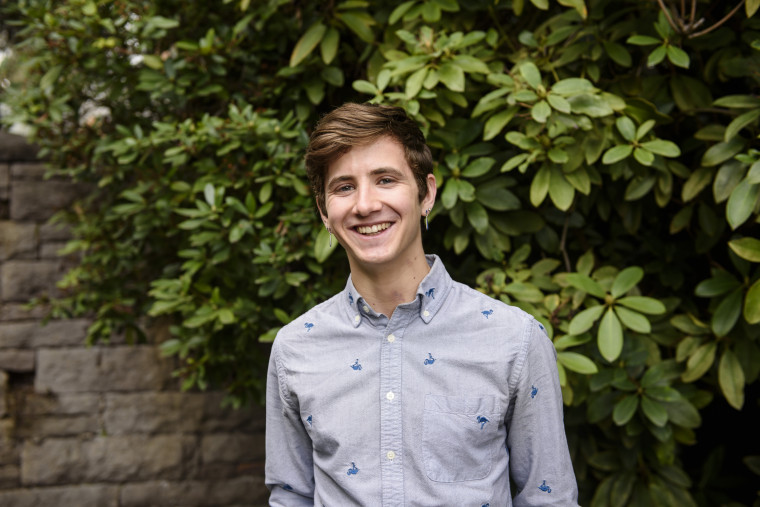Christopher Plechot Binder

Pronouns
Degree and Class Year
Hometown
Major
Extracurriculars
Overseas study
What three words would you use to describe L&C?
What made you want to come to Lewis & Clark?
I was drawn to Lewis and Clark for many reasons, but most prominent among those were its small class sizes, beautiful campus, and unique ENVS program.
What’s your favorite class? How has it expanded your knowledge?
History of Ancient Rome, taught by Gordon Kelly. This class was absolutely phenomenal and, with hard work, granted me a comprehensive knowledge of Rome during the Republican and Imperial periods. Gordon is a truly exceptional professor who has an encyclopedic knowledge of Roman history. Through this class, Gordon taught me how to think more critically about history and conduct more precise analyses of primary sources, skills which will serve me well beyond my study of Ancient Rome.
Who is your mentor on campus? Why do you consider this person your mentor?
Elizabeth Safran, without a shadow of a doubt. Ever since meeting her in my first semester at Lewis & Clark, Liz has pushed me to do work beyond what I thought I was capable of. In doing so, she has helped me become a better scholar and never lets me settle for anything less than my best. Incredibly dedicated in class and in office hours, Liz is someone who I always feel is looking out for my best interests as I navigate my time here at Lewis & Clark.
Why did you choose to major in ENVS?
After my experience in Introduction to Environmental Studies with Professor Safran, I was certain that I wanted to be an ENVS major. That class revolutionized the way that I thought about environmental studies as an academic discipline, and in doing so, made me incredibly excited to pursue the major. While I was predisposed toward ENVS coming into L&C, this singular class confirmed that I was on the right path and opened my eyes to the uniqueness of our ENVS program.
How have your ENVS courses challenged—and perhaps even changed—your thinking?
Introduction to Environmental Studies is the foremost example of an ENVS class that changed the way I think. Not only did it challenge my preconceived notions about environmentalism, but it helped me foster a new mindset for thinking about “the environment”—one which embraces the daunting complexity of human-environment relations. Through classes like Environmental Analysis and Environmental Engagement, I’ve further developed my capacity to identify and analyze a variety of contrasting (often contentious) perspectives without forming premature judgments.
How did you weave your experiences outside ENVS into your ENVS courses?
My experiences outside the ENVS program are constantly being brought into my ENVS classes, a reality which clearly reflects the unparalleled interdisciplinarity of L&C’s ENVS program. I can attest with the utmost confidence that my work in fields as seemingly disparate as economics, philosophy, and history have all meaningfully contributed toward my experiences in ENVS. To achieve this integration, I am always thinking about and applying ideas beyond the context of the class that I’m in; it is simply a matter of looking more acutely at potential linkages and then exploring those connections in ENVS classes or directly with professors in office hours.
How will ENVS concepts be a part of your future?
I hope to pursue a career in forest management, so ENVS concepts should naturally be front and center. Regardless of my career, though, I am certain that I’ll carry the core ENVS concepts with me for the rest of my life. Our focus on different models of communication, for example, has enabled me to effectively analyze the primary ways in which information is conveyed in our society. This analytical framework—a distinct feature of L&C’s ENVS program—has countless applications to my life as a member of our global society.
What does the phrase environment across boundaries mean to you?
Environment across boundaries is a phrase distinct in its ambiguity. This ambiguity is utterly compelling, and to me, it implies a willingness to explore any number of possible intersections where notions of “the environment” and difference (whether it is spatial, temporal, ideological, etc.) come into contact. Moreover, communication is the medium through which this phrase serves its purpose—to stimulate new discussions, provide space for disparate ideas, and emphasize the importance of talking with one another as a means to understand and negotiate conflict.
What’s your favorite spot on campus?
There’s this one tree on the graduate campus that is perfect for hammocking, and it’s situated in such a serene place. It’s perfect for reading, hanging out with a small group of friends, or just listening to music on a sunny afternoon.
What’s your favorite thing about living in Portland?
My favorite thing about living in Portland is the multitude of parks and urban green spaces. Especially with Portland’s stellar public transportation, it is city where accessing nature is only a bus ride or MAX train away.
What have been the biggest challenges you have faced at Lewis & Clark?
Todd Lochner, a political science professor.
How do you manage stress?
Take time for yourself, lean on your friends for support, get plenty of sleep, and plan ahead. And seriously, don’t start writing research papers the night before they’re due.
More Admissions Stories
Admissions is located in Frank Manor House on the Undergraduate Campus.
MSC: 32
email admissions@lclark.edu
voice 503-768-7040
fax 503-768-7055
Vice President of Admissions and Financial Aid
Eric Staab
Admissions
Lewis & Clark
615 S. Palatine Hill Road MSC 32
Portland OR 97219

